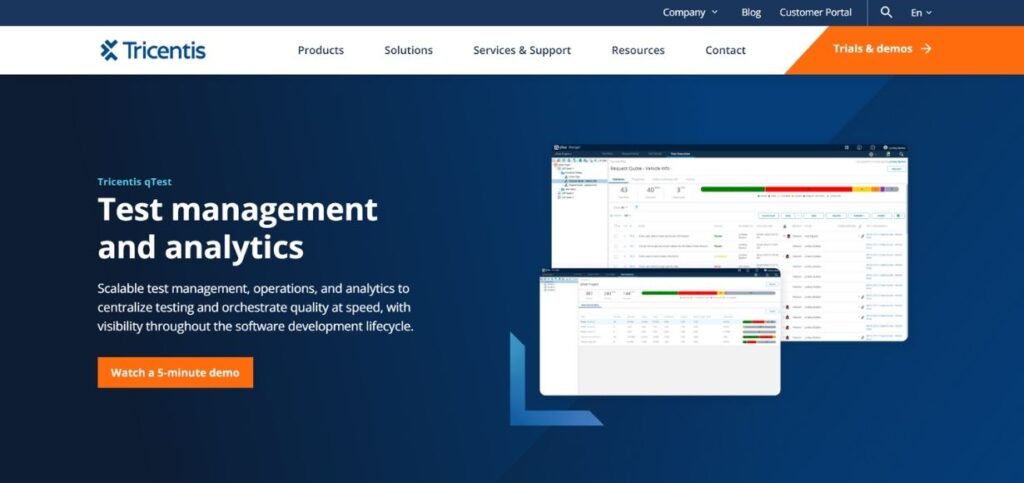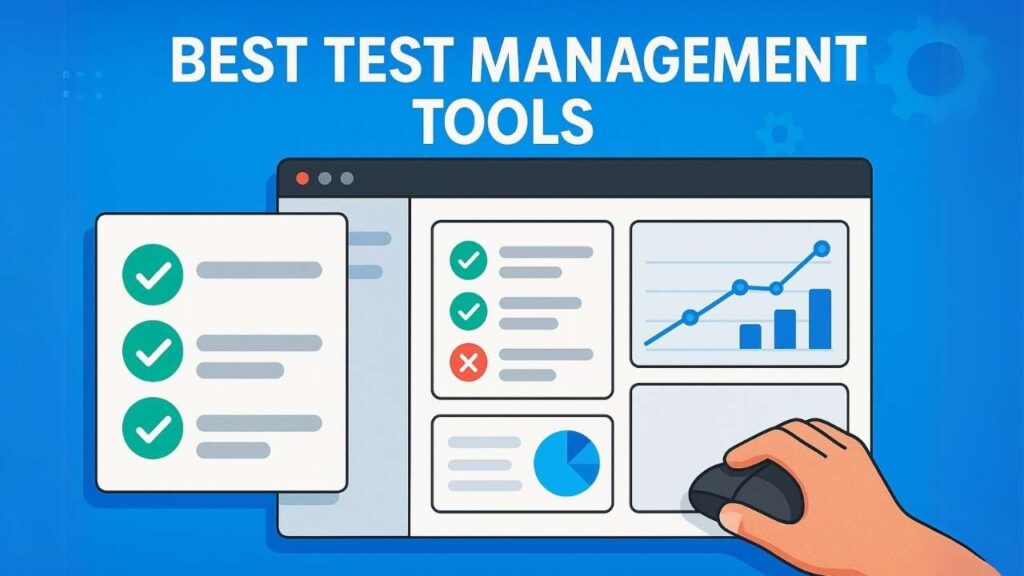Software product quality stands alongside reliability because test management tools serve as essential components to deliver those results. The deployment of test management tools enables teams to create effective plans and execute tests and monitoring as well as analysis of test cases which helps prevent software failure and improves development processes globally. Test management tools provide better collaboration and efficient workflows when used for manual testing along with automated testing and integration to CI/CD pipelines.
The range of users includes QA engineers combined with developers and DevOps teams and project managers with software testers. The selection process for our top 15 tools includes attributes of ease of use combined with development tool integration features from Jira and CI/CD platforms reporting functionality scalability range and price adaptability.
Criteria for Selecting the Best Test Management Tools
Proper test management tools must be selected to enable successful software testing, collaboration, and quality assurance. The most effective test management tools were compared with the following requirements:
- Ease of Use: The tool must possess a simple interface via which QA teams, developers, and testers can create, manage, and track test cases without problems.
- Integration Capabilities: Integration assistance with common tools like Jira, CI/CD pipelines, automation frameworks, and defect trackers enhances workflow effectiveness.
- Test Case Management: Proper test case design, organization, execution, and reuse is a major contributor that defines higher testing productivity.
- Automation Assistance: Assistance to integrate automated testing frameworks (Selenium, JUnit, TestNG, etc.) enables simple execution of tests and reporting.
- Collaboration Capabilities: There must be real-time collaboration, role-based permission, and report dashboards to drive the testing work efficiently.
- Scalability: The product should accommodate tests of different sizes, ranging from small teams up to large-scale enterprise-sized test environments.
- Reporting & Analytics: Powerful reporting, tracking of defects, and analytics for tracking progress and making data-driven decisions.
- Flexibility & Customization: Customizing the workflow, building custom fields, and building test plan configurations to tailor the tool as per particular project requirements.
- Pricing & Licensing: Being affordable by offering free trials, open-source platforms, and adaptive pricing models to accommodate various business requirements.
- Security & Compliance: Capabilities like data encryption, audit trails, and regulatory compliance (ISO, GDPR, etc.) provide secure and standardized test practices.
Having these aspects balanced, organizations can select the most suitable test management tool for their project needs, facilitating improved test coverage, quicker releases, and higher software quality.
Also read: Best SDS Management Software
Comparison Between Best Test Management Tools
Here’s a comparison table of the best test management tools, including their features, pricing, use cases, and official websites.
| Tool | Key Features | Pricing | Best For | Website |
| TestRail | Test case management, integrations with Jira and CI/CD tools, reporting & analytics | Starts at $38/user/month | Enterprises & agile teams | www.gurock.com/testrail |
| Zephyr Scale By SmartBear QAC | Jira integration, test automation, reporting, traceability | Starts at $10/user/month | Jira users & enterprise teams | www.smartbear.com/test-management/zephyr/ |
| qTest by Tricentis | Test planning, automation integration, real-time reporting | Custom pricing | Large enterprises & DevOps teams | www.tricentis.com/products/unified-test-management-qtest |
| PractiTest | Cloud-based, customizable dashboards, integration with Jira & automation tools | Starts at $49/user/month | Agile & remote teams | www.practitest.com |
| Xray for Jira | Built for Jira, automated & manual testing support, CI/CD integration | Starts at $10/user/month | Jira-based teams | www.getxray.app |
| TestLink | Open-source, test case execution, defect tracking | Free | Small teams & open-source projects | www.testlink.org |
| TestLodge | Simple UI, test case & execution management, integrations with issue trackers | Starts at $34/month | Startups & small QA teams | www.testlodge.com |
| SpiraTest By Inflectra Corporation | Test management, bug tracking, requirements management | Starts at $39.30/3 users/month | Regulated industries & large teams | www.inflectra.com |
| QAComplete By SmartBear QAC | Test case & defect tracking, automation support | Custom pricing | Enterprise QA teams | www.smartbear.com/product/qacomplete |
| Testmo | Unified test management for manual, exploratory & automated testing | Starts at $99/10 users/month | Agile software teams | www.testmo.com |
| Tuskr | Cloud-based, integrations with Jira & Slack, intuitive UI | Starts at ₹450/user/month | Startups & mid-sized businesses | www.tuskr.app |
| Kualitee | Test case execution, defect management, API integrations | Starts at $12/user/month | Mid-sized teams & DevOps projects | www.kualitee.com |
| ReQtest | Test management, requirement tracking, real-time analytics | Starts at $6/user/month | IT & development teams | www.reqtest.com |
| Qase | Cloud-based, automated & manual test case execution, API & Jira integrations | Free for small teams, paid plans start at $30/user/month | Agile development teams | www.qase.io |
| Meliora Testlab | End-to-end test management, risk-based testing, audit tracking | Custom pricing | Enterprises & compliance-driven industries | www.melioratestlab.com |
List of 15 Best Test Management Tools
1. TestRail

TestRail operates as a powerfully equipped platform that helps groups operationally organize their software testing procedures. The software system empowers users to construct test cases and run them as well as display live progress assessments for testing coverage. TestRail allows users to link their solution with Jira and Selenium while connecting to CI/CD platforms since these features provide strong support for agile and DevOps systems. TestRail enables valuable test collaboration between QA teams and developers through its dashboard customization features reporting system and test automation support for improved testing range and superior software outcomes. TestRail serves as a widely accepted tool for systematic test management solutions between MLM companies and startups.
Key Features:
- Test case management with real-time insights
- Integration with Jira, Selenium, and other tools
- Customizable dashboards and reporting
- Supports manual and automated testing
Pros:
- User-friendly interface with strong reporting capabilities
- Scalable for teams of all sizes
Cons:
- Pricing can be high for small teams
- Limited customization options
Pricing: Starts at $36 per user/month (Cloud)
Who Should Use It?
Best for QA teams, test managers, and enterprises needing a scalable and integrated test management system.
2. Zephyr Scale

Zephyr Scale is a sophisticated test management tool meant for Jira users. It offers teams a systematic test planning, execution, and reporting functionality within Jira without the requirement of third-party tools. Zephyr Scale offers test case versioning, traceability, and native integrations with automation frameworks such as Selenium and JUnit. It is scalable to meet the requirements of small as well as big teams handling complex test scenarios. With actionable, customizable reports, real-time analysis, and CI/CD support, Zephyr Scale improves the efficiency of testing and facilitates more informed decision-making in agile software development settings.
Key Features:
- Advanced test planning and execution
- Supports manual, automated, and exploratory testing
- Seamless Jira integration
- Custom reporting and analytics
Pros:
- Excellent for Jira-based teams
- Scalable for large teams with complex workflows
Cons:
- Steep learning curve for beginners
- Can be expensive for small teams
Pricing: Starts at $10 per user/month
Who Should Use It?
Best for Jira users, Agile teams, and enterprises looking for a native test management solution.
3. qTest by Tricentis

qTest by Tricentis is a solid test management software built for DevOps and agile teams. It provides end-to-end test case management, live reporting, and automation tool integrations such as Selenium, JIRA, and Jenkins. qTest allows manual, exploratory, and automated testing to be managed in one system. qTest offers such features as test planning, version control, and customizable dashboards to facilitate a smooth collaboration of testers and developers. Its scalability makes it suitable for companies that want to enhance test coverage, speed up software releases, and ensure high-quality standards in their applications.
Key Features:
- End-to-end test management with automation support
- Seamless integration with Jira and CI/CD tools
- Real-time reporting and analytics
- Supports manual and automated testing
Pros:
- Strong automation support
- Great for enterprise-level testing
Cons:
- Expensive for small teams
- Complex setup for new users
Pricing: Custom pricing based on team size
Who Should Use It?
Best for large enterprises and DevOps teams needing a high-level test management tool.
Suggested Blog: Best Product Management Software
4. PractiTest

PractiTest is a cloud solution for test management that enables QA teams to automate their testing processes. PractiTest facilitates test case management, defect tracking, and real-time reporting. It integrates with major project management and automation tools such as Jira, Selenium, and Jenkins, so that workflow automation is carried out seamlessly. PractiTest has reusable test cases, traceability, and rich analytics to enable better decision-making. The tool is perfect for agile teams in search of an easy-to-use as well as a scalable solution to operate manual and automated testing efficiently in a transparent manner throughout the software development lifecycle.
Key Features:
- Customizable test execution flows
- Integration with Jira, Selenium, and CI/CD tools
- Real-time dashboards and reporting
- Supports both manual and automated testing
Pros:
- Strong customer support
- Highly customizable workflows
Cons:
- Interface can be overwhelming
- Limited offline functionality
Pricing: Starts at $49 per user/month
Who Should Use It?
Best for QA teams, enterprises, and testers needing flexibility and customization.
5. Xray for Jira

Xray is a test management tool at the enterprise level that is tightly coupled with Jira, enabling teams to plan, execute, and track tests effortlessly. It includes manual testing and automated testing with traceability from requirements, test cases, and defects. Xray enables integration with CI/CD tools of preference, thereby becoming the de facto tool for agile and DevOps teams. With built-in reporting, test coverage analysis, and test execution capabilities, Xray enhances test efficiency. With its ease of use and native integration with Jira, it’s an attractive solution for organizations wanting to manage their testing entirely within their development workflow.
Key Features:
- Native Jira integration for agile testing
- Test execution and traceability features
- Supports automated and exploratory testing
- Real-time reporting
Pros:
- Seamless Jira workflow integration
- Cost-effective for Jira users
Cons:
- Limited outside Jira usage
- Requires additional Jira licensing
Pricing: Starts at $10 per user/month
Who Should Use It?
Best for Jira users, Agile teams, and DevOps teams managing test cases inside Jira.
6. TestLink

TestLink is an open-source test management tool that helps teams plan, execute, and control test cases in an efficient manner. It includes requirements management, test case versioning, and defect tracking and hence is an end-to-end solution for well-organized testing. TestLink integrates with bug-tracking tools like Jira and MantisBT, facilitating interaction between developers and testers. It has a web-based interface making it easy to access and reuse test cases. While it lags behind some contemporary UI features, TestLink remains an organization’s best option for an ad-free, feature-packed, and highly customizable test management tool.
Key Features:
- Centralized test management system
- Supports manual and automated testing
- Customizable reporting and test case tracking
- Integration with bug-tracking tools like Jira and Redmine
Pros:
- Free and open-source
- Lightweight and easy to set up
Cons:
- Outdated UI and limited customer support
- Lacks advanced automation integration
Pricing: Free (open-source)
Who Should Use It?
Best for small teams, startups, and open-source enthusiasts looking for a free test management solution.
7. TestLodge

TestLodge is a lightweight but efficient test case management software aimed at allowing teams to easily manage test plans and test cases. It can be used to create, run, and report test cases with ease, and allows teams to monitor defects effectively by integrating with tools such as Trello, Jira, and Asana. TestLodge is light and friendly to use, which makes it suitable for teams that require an easy test case management system. With real-time collaboration, in-depth test reports, and requirement tracking, TestLodge improves testing efficiency and assists teams in improving software quality without excessive complexity.
Key Features:
- Test case creation and execution
- Integration with Jira, Trello, GitHub, and more
- Real-time collaboration and reporting
- Simple and user-friendly interface
Pros:
- Easy to set up and use
- Affordable pricing for small teams
Cons:
- No built-in automation support
- Limited customization options
Pricing: Starts at $34 per month (5 users included)
Who Should Use It?
Best for small to mid-sized QA teams needing a lightweight, easy-to-use test management tool.
You may want read the blog on the topic Top 10 Third-Party Risk Management Tools
8. SpiraTest

SpiraTest is a full-featured test management tool offering test case management, defect tracking, and reporting within a single solution. It offers end-to-end traceability, with test cases mapped to requirements and defects. SpiraTest interoperates with automation tools such as Selenium and JUnit and is therefore well-positioned for agile and DevOps teams. It offers real-time dashboards, risk-based testing, and customizable workflows, which enable teams to streamline their testing practices. SpiraTest is most appropriate for organizations that require a highly configurable and scalable solution to enhance test coverage and software quality.
Key Features:
- End-to-end test management with automation support
- Built-in bug tracking and requirements management
- Integration with Selenium, Jenkins, and Jira
- Customizable dashboards and reporting
Pros:
- Comprehensive test management in one platform
- Strong integration with CI/CD tools
Cons:
- Learning curve for beginners
- Expensive for small teams
Pricing: Starts at $39.30 per 3 users/month
Who Should Use It?
Best for enterprise QA teams and DevOps teams looking for an all-in-one testing solution.
9. QAComplete

QAComplete by SmartBear is an adaptable test model management tool that enables test teams to effectively manage automated testing and manual testing. QAComplete gives support for test planning, defect tracking, and integration of test frameworks like Selenium and TestComplete. QAComplete gives testable workflows, report test test-taking, and requirement traceability and therefore test teams can select it as the most suitable solution to test complex test scenarios. The software product enables QA and development team collaboration by providing a shared place to keep test cases, execute, and fix defects to realize higher software quality and reduced release cycles.
Key Features:
- Centralized test case management
- Integration with automation tools like TestComplete
- Supports manual, automated, and exploratory testing
- Customizable dashboards and analytics
Pros:
- Good automation support
- Comprehensive test case tracking
Cons:
- UI feels outdated
- Can be complex for new users
Pricing: Custom pricing
Who Should Use It?
Best for QA teams and enterprises using SmartBear’s ecosystem for testing.
10. Testmo

Testmo is a modern test management tool that unifies manual, exploratory, and automated testing into one platform. It provides real-time tracking, reporting, and analytics of tests with integrations in GitHub, Jira, and CI/CD pipelines. Testmo supports test case management, automated test execution, and reporting to help agile teams with efficiency and transparency in software testing. Its cloud architecture and easy-to-use interface make it a scalable solution for organizations looking to automate their testing process. Testmo best fits teams that require an end-to-end method of test management for multiple testing methods.
Key Features:
- Unified test management for all testing types
- Integration with Jira, GitHub, and CI/CD tools
- Powerful reporting and analytics
- Supports automation frameworks like Selenium
Pros:
- Intuitive interface and easy setup
- Great for automation-first teams
Cons:
- Limited third-party integrations
- Pricing may be high for small teams
Pricing: Starts at $99/10 users/month
Who Should Use It?
Best for test automation teams and Agile teams needing an all-in-one test management platform.
11. Tuskr

Tuskr functions as a cloud-based test management tool which proves perfect for teams that need an easy-to-use affordable solution. With real-time analysis, Tuskr provides its users access to test case management along with test execution capabilities. The test management system Tuskr supports integration with essential bug-tracking tools Jira, Trello and Asana which enable smooth defect monitoring. Tuskr provides beneficial features for startups along with small to medium-sized enterprises because it combines a user-friendly design with customizable workflows and collaborative tools. This testing tool enables both manual testing and automation and delivers maximum efficiency to teams that require basic testing skills after deployment.
Key Features:
- Test planning, execution, and reporting
- Integration with Jira, Slack, and Asana
- Custom workflows and dashboards
- Multi-user collaboration features
Pros:
- Budget-friendly for small teams
- Simple and intuitive UI
Cons:
- Lacks advanced automation features
- Limited enterprise scalability
Pricing: Free for small teams, Paid plans start at ₹450 per user/month
Who Should Use It?
Best for startups and small QA teams needing a simple, cost-effective solution.
12. Kualitee

Kualitee is a defect-tracking and test-management tool that allows teams to develop, run, and monitor test cases efficiently. It integrates with Jira, Selenium, and CI/CD pipelines, which makes it suitable for agile teams. Kualitee provides real-time test progress monitoring, requirement mapping, and customizable dashboards to report in great detail. Its easy-to-use interface and collaborative capabilities make it an ideal solution for QA teams requiring a single repository to manage test cases and defects and enhance software quality, and development efficiency.
Key Features:
- Test case management with defect tracking
- Integration with Jira, Selenium, and CI/CD tools
- Customizable reporting and analytics
- Multi-project support
Pros:
- Strong defect tracking features
- Good integration with testing tools
Cons:
- UI could be more modern
- Can be slow with large data sets
Pricing: Starts at $12 per user/month
Who Should Use It?
Best for QA teams and test managers who need a balanced test management and defect tracking solution.
13. ReQtest

The cloud-based ReQtest system delivers test management features that cover planning for testing along with requirement tracking and bug monitoring. Teams leverage ReQtest to automatically create test cases and run them before they produce effective reports. ReQtest makes it possible to integrate Jira so developers and testers can coordinate their efforts easily. ReQtest presents itself as an optimal solution for teams who need a scalable and flexible test management tool because it provides real-time data alongside visual tools in a user-friendly interface. The tool works best for large projects that need advanced test documentation alongside strong traceability over team members.
Key Features:
- Requirements management and test case execution
- Bug tracking with visual reports
- Integration with Jira and Azure DevOps
- Real-time analytics
Pros:
- Combines test and requirements management
- Easy collaboration features
Cons:
- No built-in automation support
- Slightly expensive for smaller teams
Pricing: Starts at $45 per user/month
Who Should Use It?
Best for business analysts and QA teams managing both requirements and testing.
14. Qase

Qase is an agile test management tool developed specifically for agile teams. It features test case management, tracking execution, and reporting in real-time. Qase provides integration with Jira, GitHub, and CI/CD tools to seamlessly automate and trace defects. Qase boasts of a simple-to-use UI, API integration, and collaboration aspects, which suits small to mid-size teams perfectly. Its pricing options are flexible, Qase provides a budget-friendly solution for organisations looking for a simple but full-featured test management solution that can support efficacy and collaboration.
Key Features:
- Test case management with automation support
- Integration with Jira, GitHub, and Slack
- Real-time reporting and analytics
- API access for custom integrations
Pros:
- Clean and intuitive UI
- Affordable for startups and small teams
Cons:
- Limited reporting features
- No built-in bug tracking
Pricing: Free for small teams, Paid plans start at $30 per user/month
Who Should Use It?
Best for startups, Agile teams, and automation testers looking for a simple, modern tool.
15. Meliora Testlab

The software solution Meliora Testlab presents comprehensive testing functionality covering requirements analysis, test case administration and bug reporting capabilities. The solution enables automation protocols and allows connections between Jira, Jenkins, and Selenium systems. The system delivers effective reporting together with compliance tracking features which make it suitable for healthcare and financial sectors requiring strict regulations. The deployment model of Meliora Testlab includes both cloud-based solutions alongside on-premise solutions that accommodate organizations of different sizes.
Key Features:
- Test case management with traceability
- Built-in defect tracking and reporting
- Supports manual and automated testing
- Integration with Jira and CI/CD tools
Pros:
- All-in-one solution for testing and defect management
- Strong compliance tracking for regulated industries
Cons:
- Complex interface for beginners
- Limited third-party integrations
Pricing: Custom pricing
Who Should Use It?
Best for regulated industries, enterprises, and compliance-focused teams needing strong traceability.
Conclusion
The best test management tool is selected based on team requirements, the size of your project, and testing strategy. TestRail, qTest from Tricentis, and SpiraTest provide end-to-end test management, automation, and large-scale reporting for large and enterprise-class projects. Xray for Jira and Zephyr Scale are also perfect solutions for existing Jira-based environments with integration and traceability.
Smaller organizations and startups would find TestLodge, Qase, and Tuskr more affordable and easier to use. Open-source options like TestLink are suitable for budget-conscious teams that need a flexible solution. The best tool is the one that fits your testing process, collaboration requirements, and business objectives.
FAQs
1. What is a test management tool, and why is it important?
A test management tool is a software solution that assists teams in planning, executing, tracking, and controlling software testing activities. It is significant because it enhances test organization, collaboration, automation framework integration, and real-time reporting for enhanced decision-making.
2. What should I look for in a test management tool?
Major features encompass test case management, automation support, integrations with tools such as Jira and CI/CD pipelines, defect tracking, real-time reporting, scalability, and collaboration capabilities.
3. What are the best test management tools for users of Jira?
Xray for Jira and Zephyr Scale are excellent options for users of Jira because they provide out-of-the-box integration, traceability, and full test management capabilities within Jira’s platform.
4. Do free test management tools exist?
Yes, free test management tools exist.
TestLink is an open-source test management tool that is quite popular. There are a couple of tools such as Qase and Tuskr that have a free plan with limited capabilities for small teams.
5. How do test management tools enable automated testing?
The majority of test management tools are automated using frameworks such as Selenium, JUnit, and TestNG. They enable teams to plan, run, and report on automated test results in a single platform for better efficiency and tracking.

